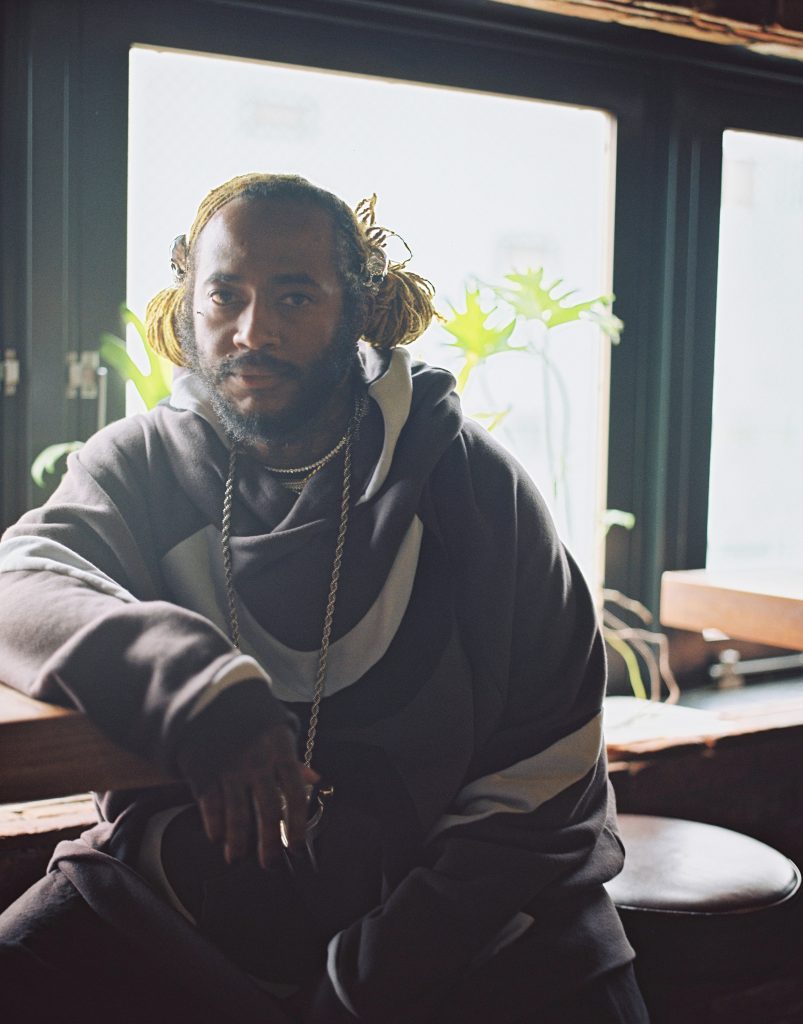
Thundercat
Bassist, songwriter, music producer. Born October 19th, 1984. From Los Angeles, California. With his remarkable bass playing, sweet vocals, eccentric fashion sense, and an endlessly cheerful personality, he has captured the hearts of fans everywhere. In addition to his solo work under the name Thundercat, he has also collaborated on projects with Flying Lotus, Kendrick Lamar, Travis Scott, Gorillaz, and the late Mac Miller, among others. In 2022, he toured the world with the Red Hot Chili Peppers as a supporting act. He is also known for his affinity for Japanese culture like anime and video games. His ability to effortlessly and charmingly walk the line between jazz, hip-hop, funk, AOR, and LA beats in his playing is nothing short of remarkable.
https://theamazingthundercat.com
Instagram:@thundercatmusic
X(ex.Twitter):@Thundercat
YouTube:@thundercatmusic
Many of Thundercat’s friends appear in his interviews. His close friend Flying Lotus, of course, as well as his childhood otaku pals, buddies from his choir days, designers, nail artists, Kendrick Lamar, Domi & JD Beck, and the dearly departed masked hip-hopper, MF DOOM. He considers his position in every encounter, all while honing his technique and humor. His development is like that of the character Vegeta from his favorite anime Dragon Ball. In this interview, we discuss the connection between animation, video game music, and Thundercat.
In every encounter, he contemplates his position while honing his technique and humor. His maturing presence is just like Vegeta from ‘Dragon Ball,’ whom he loves, isn’t it? We discussed the connection between animation, video game music, and Thundercat in this interview. He appeared with large Sonic the Hedgehog and MF DOOM necklace hanging around his neck.
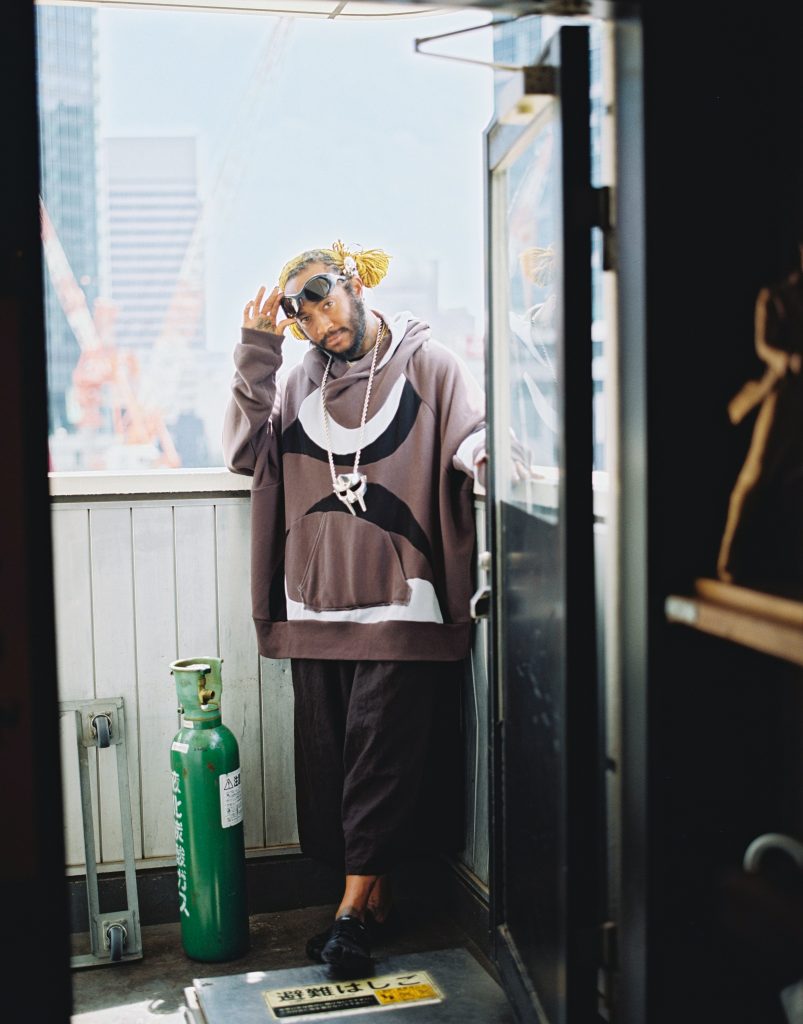
– That MF DOOM necklace is really great.
Thundercat: It’s cool, right? This has a story to it. Flying Lotus and I had an opportunity to work with MF DOOM before he passed, so we went to see him in London, where he lived.
Apparently, MadLib talked to MF DOOM about me, and he knew that I had worked with Erykah Badu. He and I had been wanting to connect.
– You worked on “Lunch Break” with MF DOOM. What a cool song.
Thundercat: He was amazing! He showed me music that nobody else would know, and he listened to a tune I was writing with Flying Lotus. We hit it off so hilariously well. He was interested in the jewelry I was wearing, and asked me a lot of questions about it.
– His passing was truly a tragedy.
Thundercat: MF DOOM was collaborating with an LA-based designer called Han Cholo on making special rings. Before he passed, he asked me how he could pay me for my work. I told I didn’t want money, so instead, he made me a ring and necklace from a casting mold he had and sent them to me. Unfortunately, those rings were stolen.
– How sad…
Thundercat: I still have the necklace, though. It’s small, different from what I’m wearing right now. I became friends with the guy who makes his masks, and we talked about making something for his memorial. Together, we made the mask necklace I’m wearing now. It’s an original necklace with garnets in it. It’s very heavy (laughs). But I work out, so it’s fine (laughs).
– (Laughs).
Thundercat: MF DOOM was a great lyricist and producer. I also loved his personality. Everyone notices when I wear this necklace. It gives me an opportunity to tell this story, like I’m doing now. It feels as though I’m wearing his memory.
– You’re wearing his memory. What a lovely story.
Thundercat: It’s my second favorite one of my necklaces. My most favorite is this Sonic one (laughs).
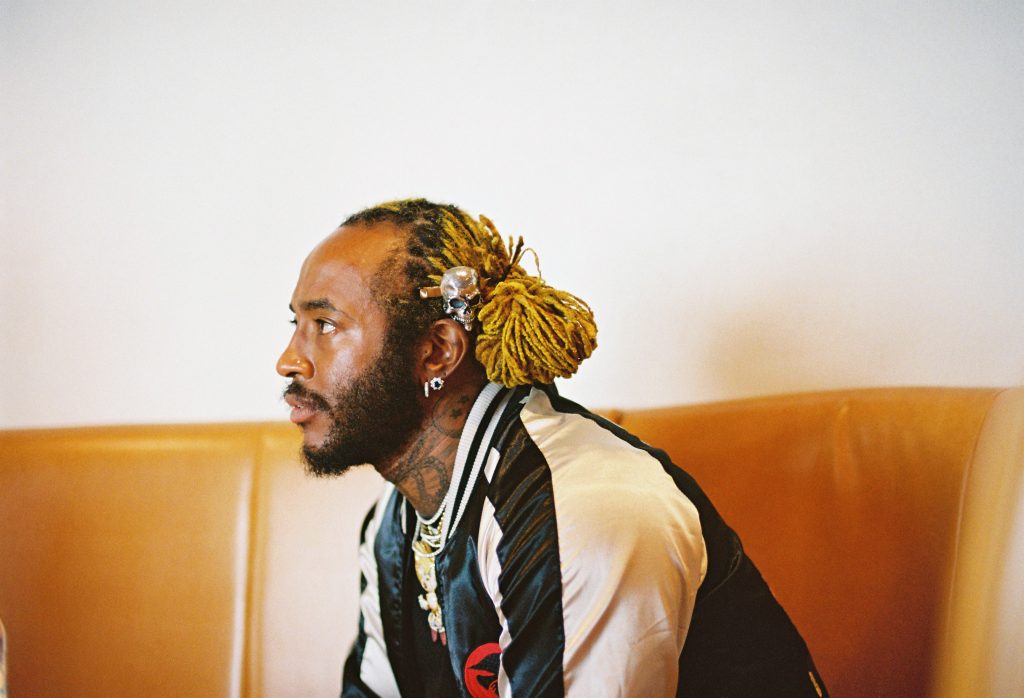
– Is Sonic [the Hedgehog] a character you’ve always liked?
Thundercat: Yeah, I love Sonic. Although my number one right now is Mario (laughs). This Sonic necklace was custom-made for me. The lyrics of “Can You Feel the Sunshine” from the game Sonic R are etched into it.
– Did you watch The Super Mario Bros. Movie?
Thundercat: I haven’t yet. It’s been a very busy season. In the theaters in LA, where I live now, tickets have been selling out.
– It’s so popular.
Thundercat: It really is. But I don’t think anyone is seeing it anymore. I hope I have the theater all to myself when I go see it (laughs).
– Some American critics have called it juvenile, but I don’t think it is!
Thundercat: Mario is for kids anyway (laughs). That’s not a criticism.
Vegeta-like Humor
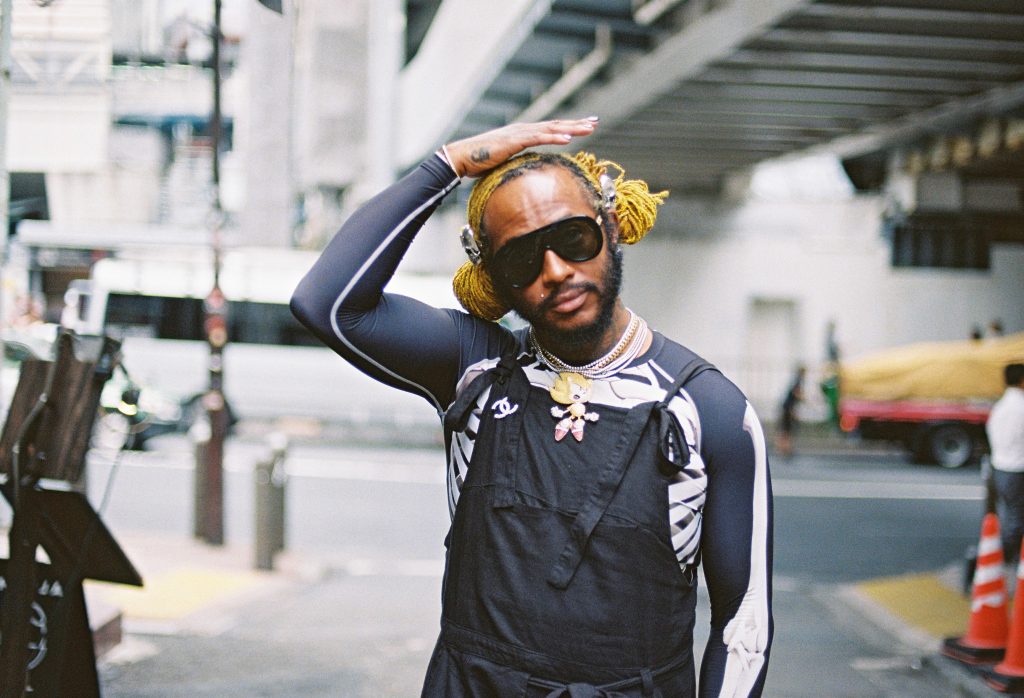
– You’re known to like Dragon Ball, but you’ve mentioned before that you relate to Vegeta more than Goku.
Thundercat: I do.
– I think you have some Vegeta-like qualities.
Thundercat: I think so, too! Goku is Flying Lotus, right? (Laughs).
– Exactly! Or Kendrick Lamar.
Thundercat: Kendrick is more like Gohan’s Beast from Dragon Ball Super (laughs).
– I think your songs are very humorous.
Thundercat: Indeed.
– “Dragon Ball Durag” is about begging your lover for love, but you ask, “how do I look in my durag?” several times in the song. It’s very funny.
Thundercat: Hahaha! Yeah, it seems like a love song at first, but it’s actually a terrible song (laughs).
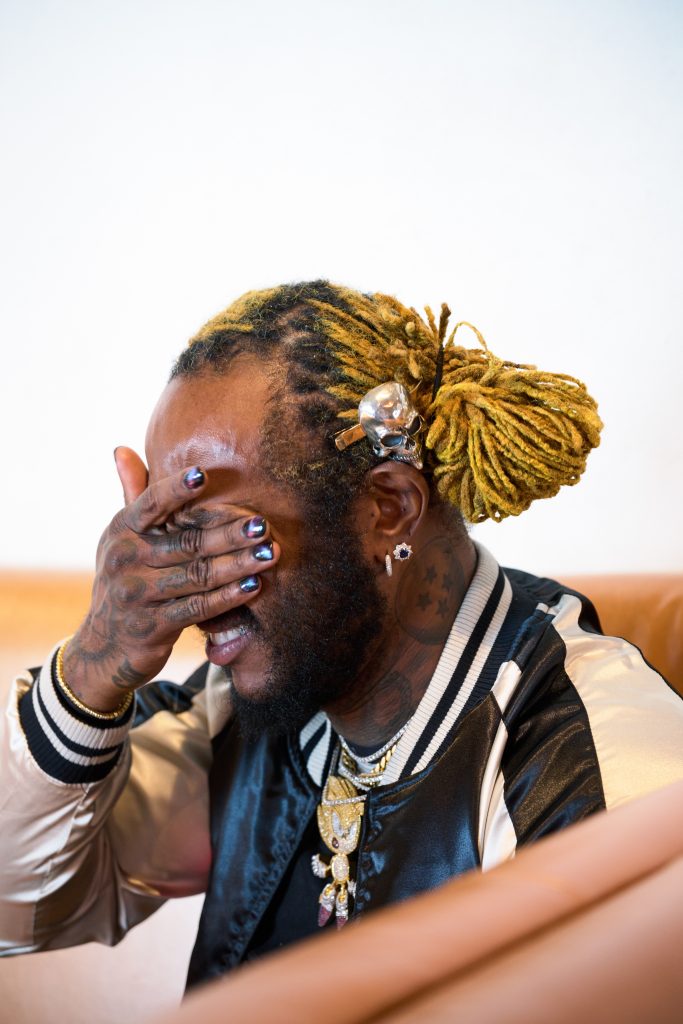
– In “Friend Zone”, you reference Kendrick Lamar’s “Bitch Don’t Kill My Vibe” after you say, “You can go or you can go, I’d rather play Mortal Kombat anyway”. That made me crack up.
Thundercat: It’s funny, right? I was worried about that reference, but Kendrick thought it was funny, too.
– I think that humor is what’s most “Vegeta-like” about you.
Thundercat: Totally. He’s prideful, and yet has no choice but to be humble in front of someone amazing like Goku. No one is watching when he thinks he’s killing it (laughs).
– Perhaps it’s because of these experiences that he gradually develops a more objective perspective and becomes a kinder character.
Thundercat: I also have another perspective in me. What I want to say may not always come across the way I want it to. I’ve had a lot of difficult experiences like that. So when I’m trying to say or express something, I always have several points of view.
Influences From Video Game Music
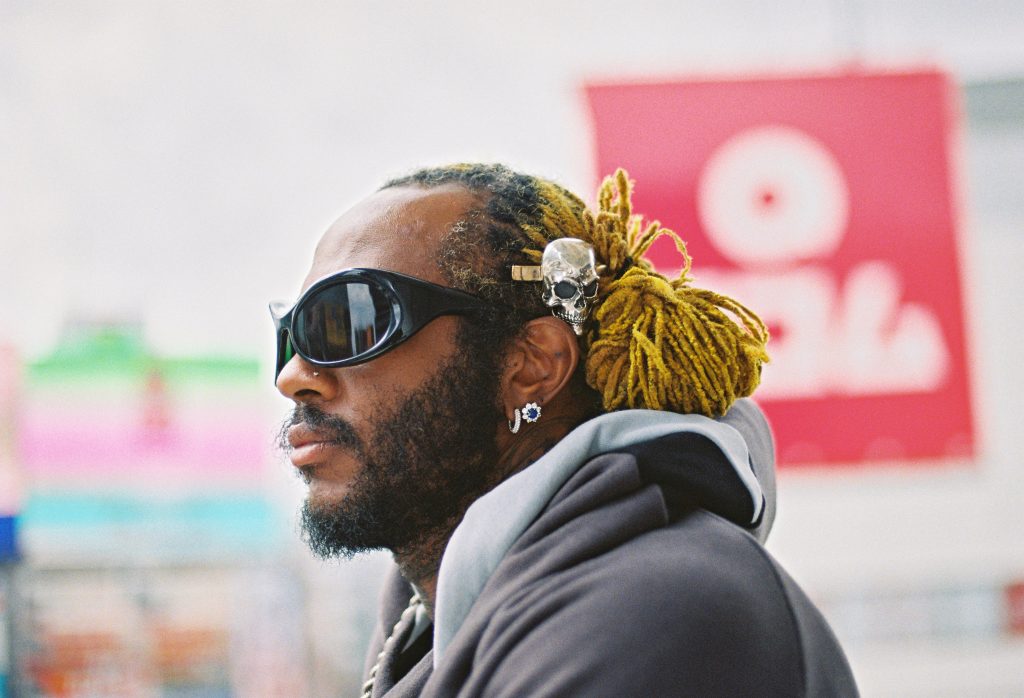
– Your music itself is very versatile. You started your career as a bassist for Suicidal Tendencies and Erykah Badu, so you’ve been involved in both hard core punk and neo-soul.
Thundercat: That’s right.
– Your current music incorporates jazz and hip-hop grooves, but also contains a video game-like linearity. It feels like you’re always mixing distant musical influences.
Thundercat: I grew up listening to all kinds of music. I loved jazz and video game music, too. I also like adding color to simple things. Even in Mario, the first theme song is still being used today, but it evolves along with its different arrangements, causing the song’s colors to change. I find that to be intriguing. It’s all about the tonal palette.
– Video game music was initially very simple.
Thundercat: Video game music from the 1980s to the early 1990s is wonderful. I love Yoko Shimomura’s work at CAPCOM. She was able to do the most with the limited resources available to her. That’s what intrigued me as a kid. Video game music now is richer and broader. The music is still great, but I’m drawn most to the uniqueness of game music from a time with limited resources.
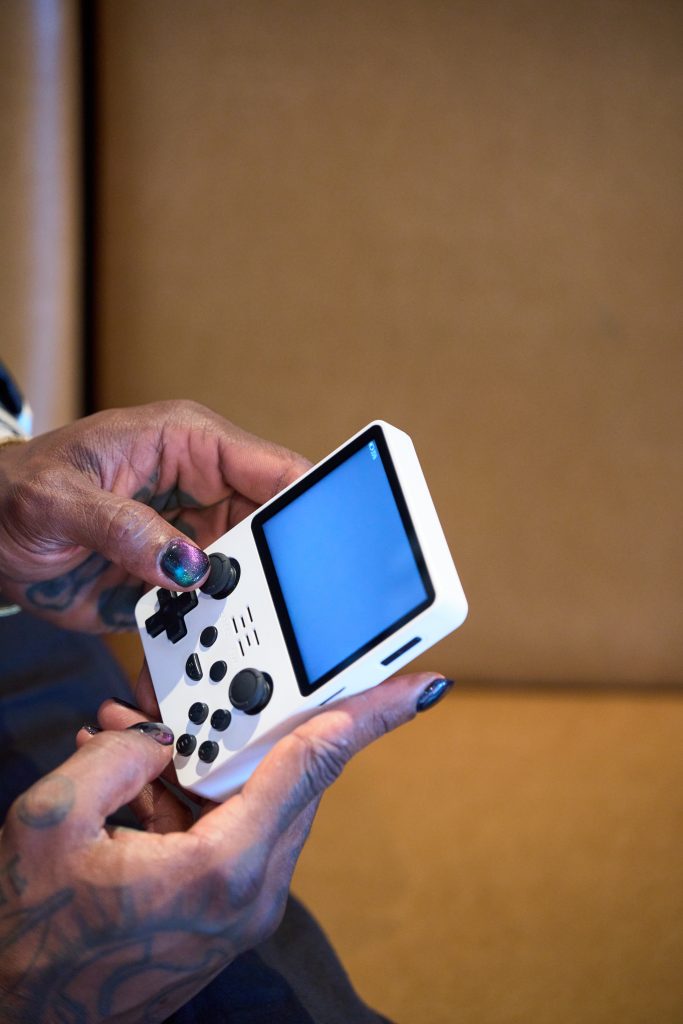
– I sense a YMO vibe to your music, but maybe that’s also through video game music. YMO very heavily influenced game music. For instance, in the Dragon Ball game Super Butoten, there is a song that sounds almost exactly like “Rydeen”.
Thundercat: I know that song (laughs). They’re such big artists, afterall. I think many people including myself have been influenced by them in some way. YMO and Ryuichi Sakamoto have many complex elements hidden within their simplicity.
– You’ve called Dragon Ball a “mature work” in the past. In what way do you think it’s mature? In Japan, Dragon Ball is seen as a show that young boys watch before they mature. I thought that difference in perspective was interesting.
Thundercat: I think Dragon Ball is considered violent for Americans, which is why it’s not seen as something for children. Violent scenes in Dragon Ball Z and NARUTO are edited out. I don’t think it’s necessary, though.
– I see. So what children consume shouldn’t be violent.
Thundercat: Interestingly, the cartoons that are most popular in the US are all Japanese. Jujutsu Kaisen,NARUTO, Dragon Ball Z… That kind of anime is weirdly edited. I’ve been watching Neon Genesis Evangelionsince the 90s. It has a cult-like power to it. Shows like that are also edited, but that loses its original rawness.
– Interesting.
Thundercat: But cartoons and comics catered to American adults have always been very violent! I’ve been influenced by violent comics, so my opinion may not be the same as the average American (laughs). You can’t trust me because I’m crazy.
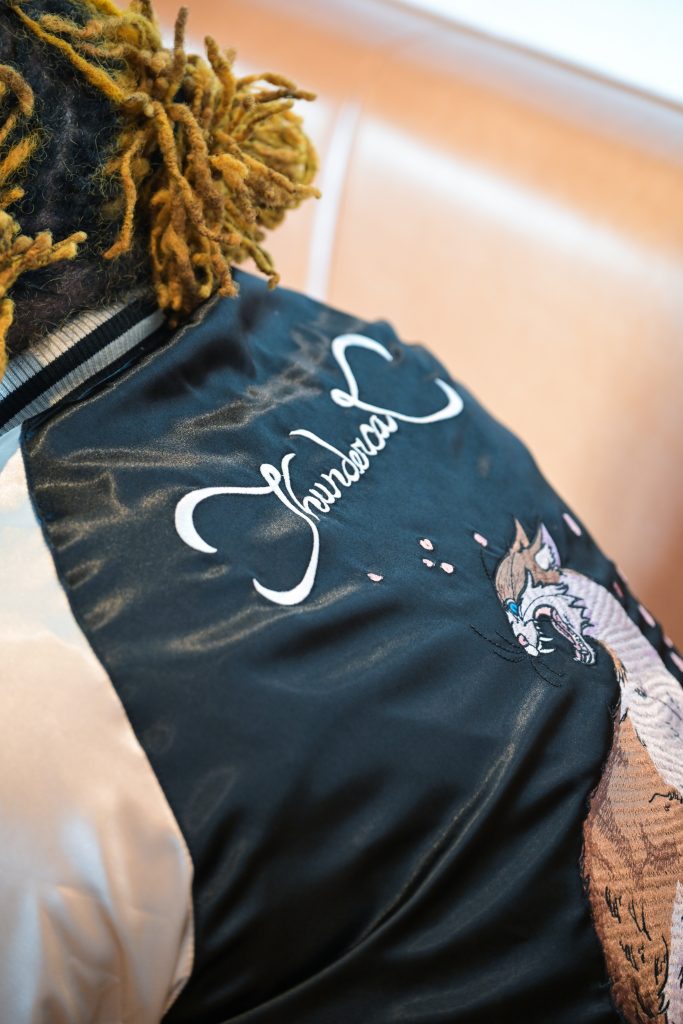
– In the Dragon Ball animation, there are scenes where the protagonists are in training. But American superheroes are superheroes from the beginning.
Thundercat: Batman and Ironman are both rich (laughs). Their own physical capabilities are the same as a normal human.
– I’ve heard that the process of “training to get stronger” seen in Dragon Ball may be similar to the African American experience. What do you think?
Thundercat: That’s possible. Struggle, strife, and conflict are important elements in the African American community. Even the word “hero complex” exists. I think we can relate to the work ethic seen in Japanese animation because society doesn’t validate our struggle.
– You feel sympathetic.
Thundercat: I’m not sure, though. I was just crazy about anime when I was a kid. I also had Mexican and Asian friends who liked Dragon Ball. But we were a minority in the classroom. Race didn’t matter, we were just nerds (laughs). But those nerds have now grown up and are in positions to make money, and they use their money lavishly on whatever they want. Which is why anime has become even more popular (laughs).
– (Laughs).
Thundercat: I talk to those friends a lot about how no one understood our interests back then. We wanted the Dragon Ball Carddass that was only sold in Japan. Instead, we filed photocopies of the Carddass we found online and circulated them among ourselves. We would be like, “You can have them today, but I’ll take them tomorrow”. We had fun looking at the files and tried our best to create our own stories from them.
– That’s just like your story about video game music. You got creative with the limited resources available to you.
Thundercat: Exactly. We have to do what we can for ourselves.
Collaboration with Kevin Parker
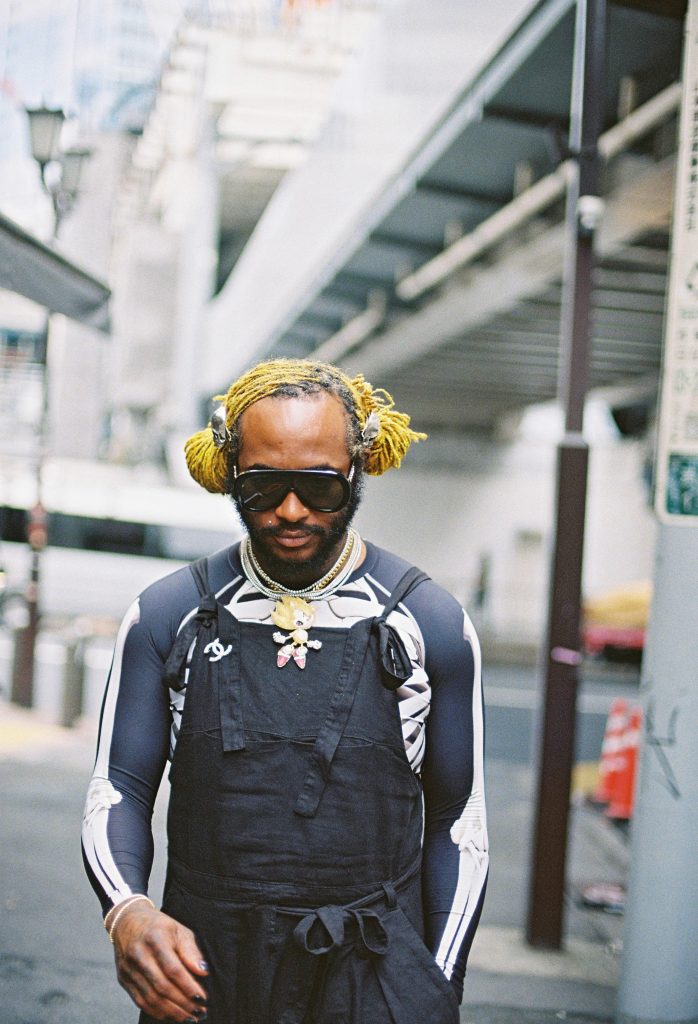
– How did your new song “No More Lies” in collaboration with Tame Impala’s Kevin Parker come about?
Thundercat: I’ve been wanting to work with Kevin since my first record. I met him at the Grammys, but I was drunk and don’t remember (laughs). He said he thought we had met before when I approached him (laughs), and told me he also wanted to work with me. We made the song together in person, and it was really fun. We were lucky – it felt like pieces of a puzzle fitting together.
– You and Kevin have similar voices. Your whisper-like singing voice seems unique among Black musicians.
Thundercat: I sang in my church’s choir when I was a kid. I also went to the Yamaha School for vocals and instruments, so I was never against singing. The background vocalists in the recordings are friends from childhood, too.
– I had no idea.
Thundercat: Although it took me a long time to get used to singing on records and at live shows. I even got discouraged when my friends told me they didn’t like my voice (laughs). But all the players I admire, sing. Tony Williams, George Duke, Frank Zappa. Even Jaco [Pastorius]. I told myself if Tony Williams could sing, I could. His voice is so crazy (laughs). If his voice is acceptable, mine is, too.
– I think your soft voice beautifully contrasts with your percussive bass-playing.
Thundercat: I’ve always been a tenor. I’m good at projecting higher notes, too, so this type of singing is good for me. My normal voice is deep, though. I sound like Slipknot when I sing in my chest voice (laughs).
– I would love to hear that (laughs).
Thundercat: It’s super hard!
– The skull bag you have with you today is a collaboration with Prospective Flow, right? What is your connection with them?
Thundercat: They’ve expanded into LA from Japan now, but I wore their clothes before I knew them. Their stuff fits really well. Domi & JD Beck knew them initially, and introduced me.
– What a connection.
Thundercat: The collaboration was recent, but we’ve been friends for a long time. They’re good people.
– Your jewelry, nails, and hairstyles have a femininity to them. Is that a conscious effort?
Thundercat: I’ve been asked this before. I’ve been told it’s an “inherent femininity”, but that doesn’t feel right to me. Maybe it’s because I toured with Eric Benét (laughs). Maybe his sexiness triggered my femininity (laughs). I actually just like shapes and colors more than masculinity and femininity. Intuition and gut feeling are everything.
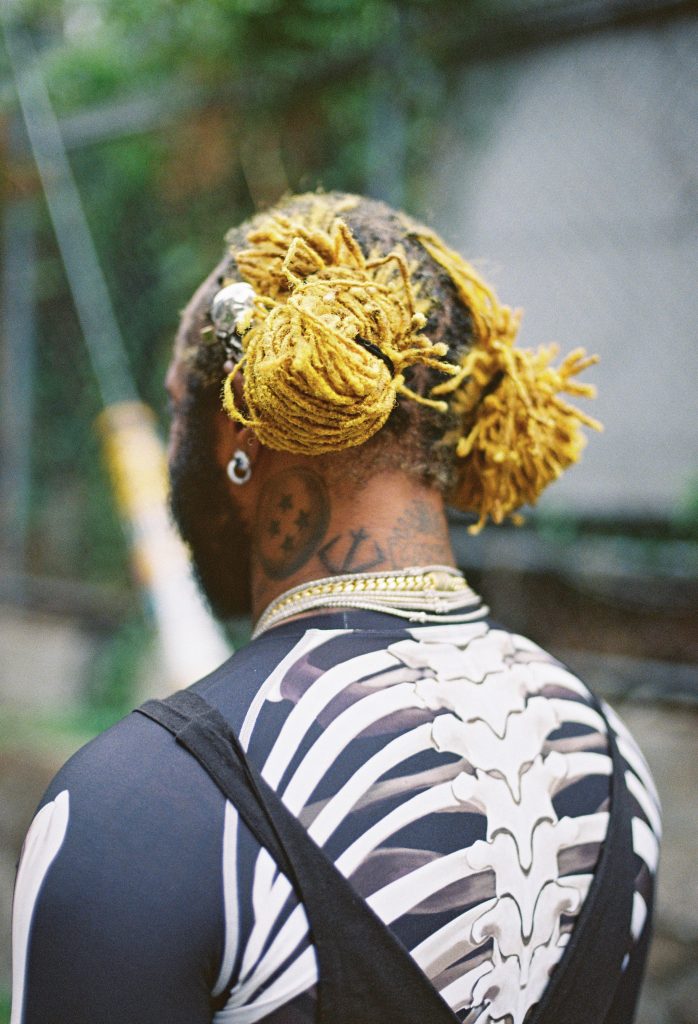
– Your nails today are beautiful, too.
Thundercat: My nail artist friend in LA did them for me. She’s a talented artist. This is one of her simpler designs.
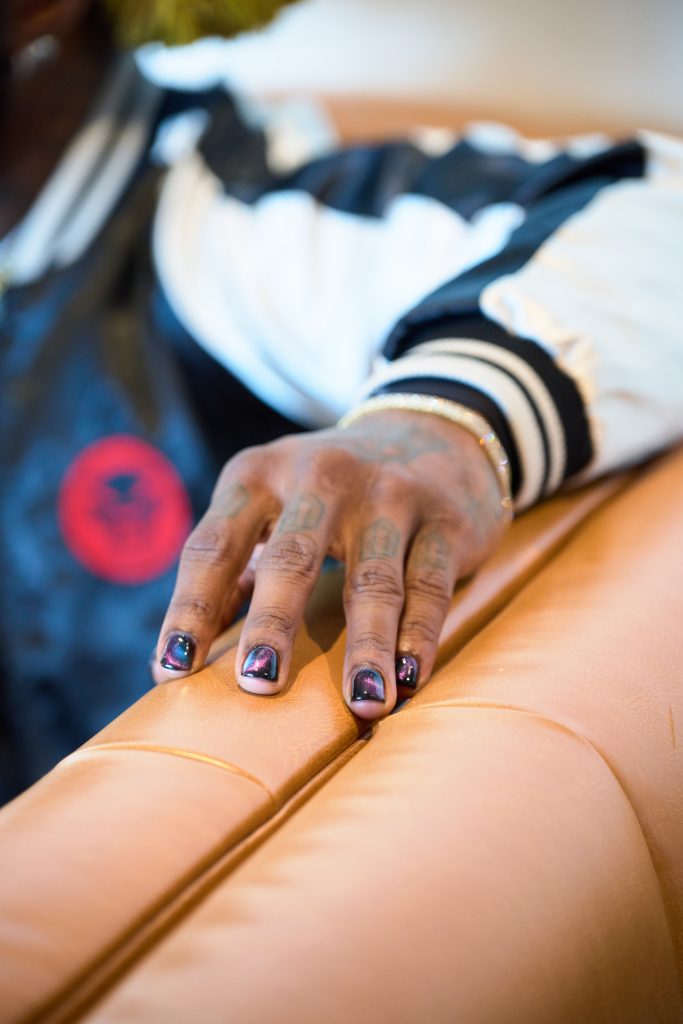
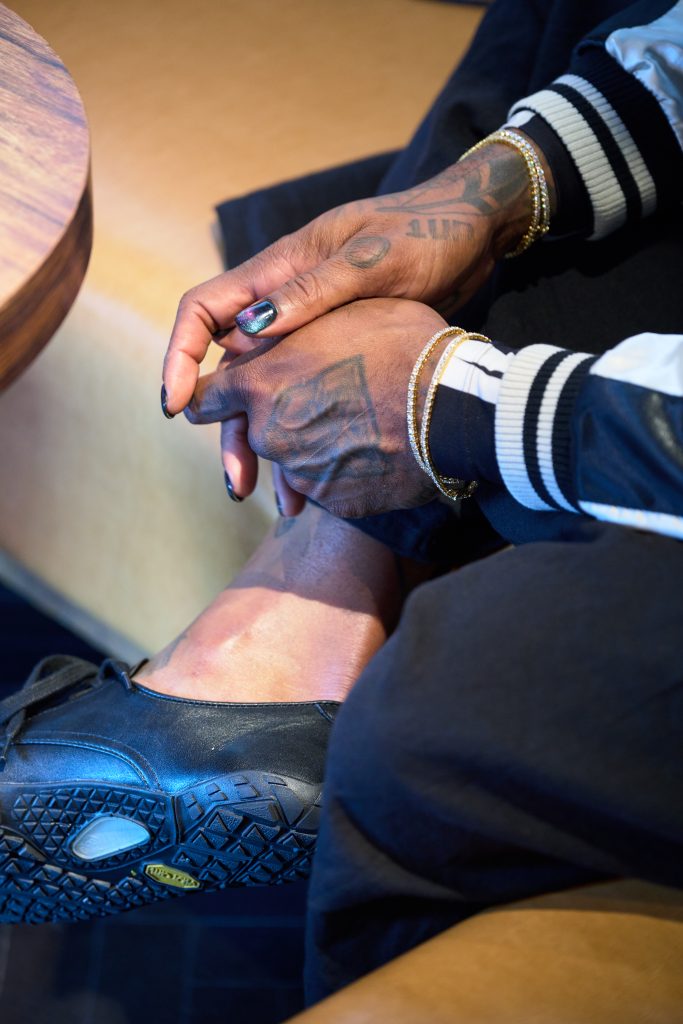
– Your stories contain many names. Listening to how you talk and watching your gestures, I get a sense that you are who you are because of the connections you have with other people. Have you heard about Hakushi Hasegawa, who recently joined Brainfeeder?
Thundercat: Of course. I listened to their new song, too. It’s a great tune, and the video was amazing, too. It’s a good fit for Brainfeeder because of its eclectic sound. I’ve met them once, but I was drunk so I don’t remember (laughs). I would love to meet him again.
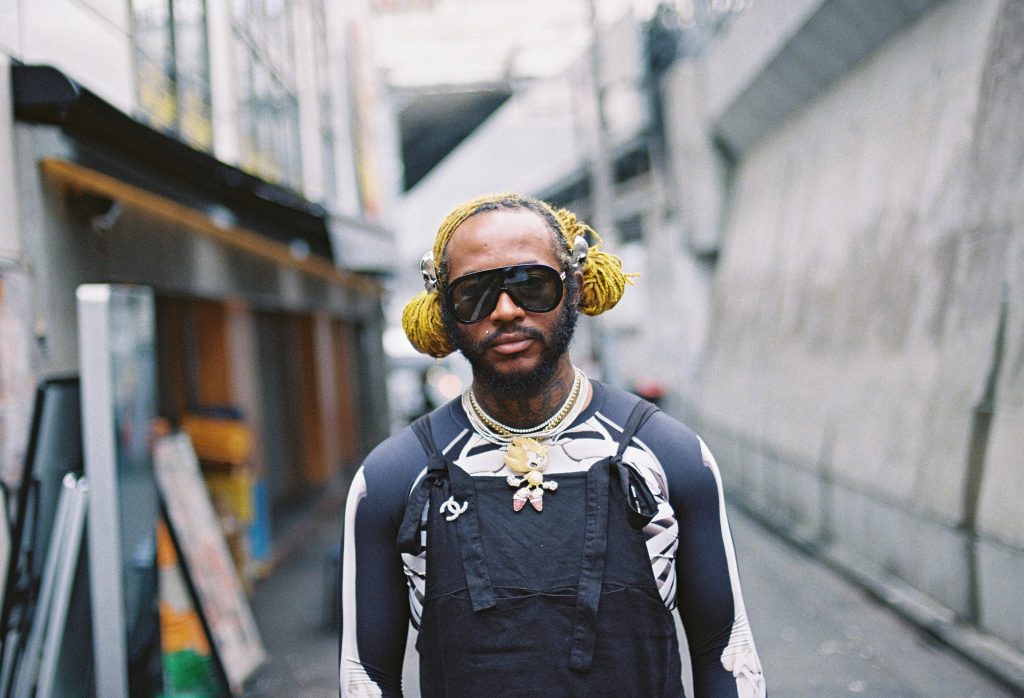
Photography Takuroh Toyama
Translation Mimiko Goldstein

